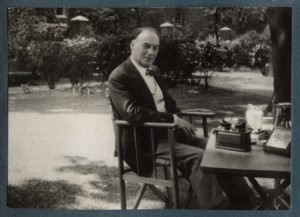 To Charles P. Davis
To Charles P. Davis
C/o Brown Shipley & Co
123, Pall Mall, London, S.W.1
Hotel Bristol
Rome. February 18, 1936
Dear Davis,
Since you complain of my remissness, I will answer your letter, and thank you for the newspaper cuttings at once, but I warn you that I am no letter-writer. Keeping up correspondences is an anachronism, as Mr. Eden says war is: but we sometimes relapse into both, and rather like it. My novel is having a great success. I have already got $5,000 for it (half of what the Book-of-the-Month Club paid Scribner for their edition of 40,000 or 35,000 copies) and more is promissed both by the American and British publishers. Isn’t it an odd thing for an old professor to become a popular entertainer, when he has one foot in the grave, and twenty volumes of philosophy to his discredit? The reviews of The Last Puritan seem strangely timid. I haven’t seen many, because I don’t subscribe to the newspaper-cutting agencies; but both in England and in the United States, while nothing hostile has appeared, there seems to be some embarrassment, and all the tender [illegible ] spots in the book, moral, political, and religious, are avoided with extreme caution. Only the question whether this is really a novel, and whether the characters are “alive” or speak as real people speak, seems to agitate the reviewing mind. But supposing a book is not really a novel, ought it to be one? And if the characters speak as they don’t speak in real life, ought they to speak so in a book? A candid friend, looking at a modernist picture, observed to the artist: “Frankly, I never saw a woman that looked like that” To which the painter replied, “But my friend, this is not a woman. It is a painting.” The only review that I have seen that faces my book squarely is one by Desmond MacCarthy that appeared in the Sunday Times (of London); and even there, the excellent man got mixed up at the beginning with “essences” and wasted half of his space groping in utter darkness. Some letters I have received, especially from strangers, are also very good. You see, my friends and the professional critics begin with preconceptions about me and about novels: they read with a view to finding certain things, or drawing certain conclusions, to be proclaimed in their review: whereas a book like this, that isn’t a pot-boiler (though it is going to supply me for a while with spaghetti) or written to order, but has been growing up with me almost from childhood up, requires to be taken as a natural phenomenon, like the queer beasts at the Zoo, and not forced into accepted moulds. However, I can.t complain. People are most respectful and kind to my grey hairs; and besides I suspect that the book-trade makes it obligatory for critics to praise all books noticed at all. The old slashing invectives are an anachronism too, like war. Your old friend,
G.S.
From The Letters of George Santayana: Book Five, 1933-1936. Cambridge, MA: The MIT Press, 2003.
Location of manuscript: Butler Library, Columbia University, New York NY
